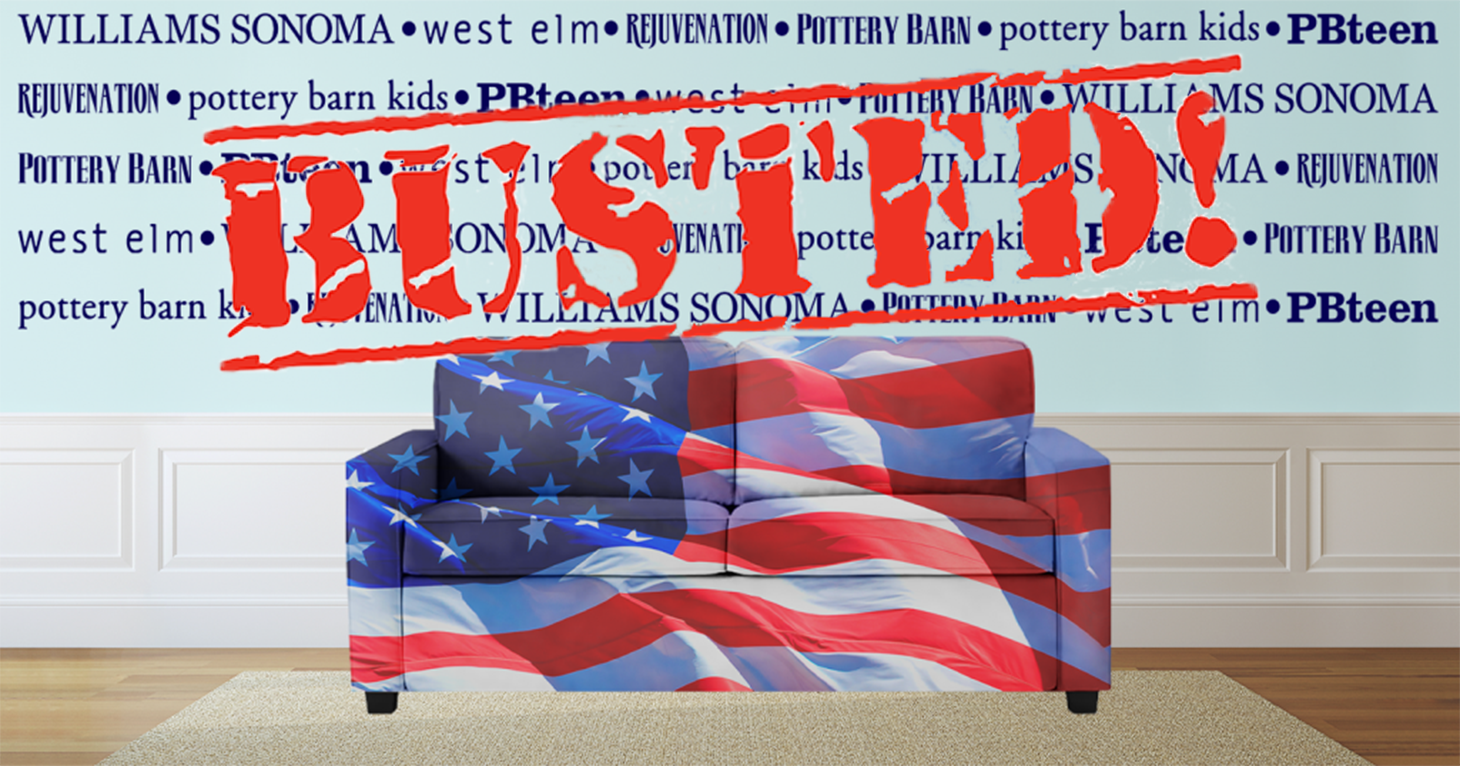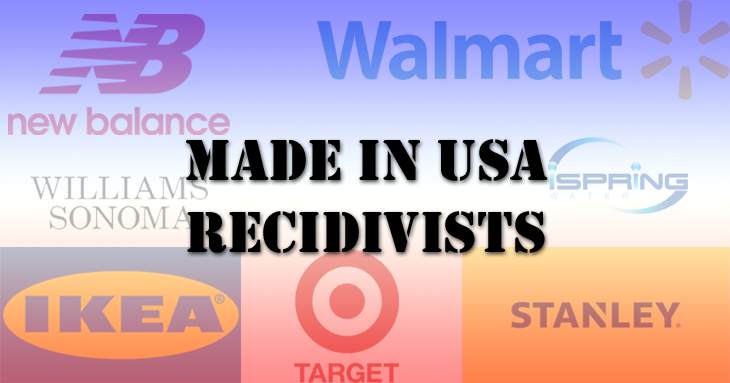
Williams-Sonoma to Pay $1 Million to Settle Deceptive Ad Lawsuit Sparked by TINA.org
FTC takes action against home goods and kitchenware company for misleading made in the USA claims.
TINA.org found the German automaker didn't have the support to claim its Sprinter van was "built in the USA."
Mercedes-Benz has slammed the brakes on a multimillion-dollar deceptive made in the USA marketing campaign for its 2019 Sprinter van following an investigation by TINA.org.
For months the German automaker claimed that its 2019 Sprinter van was “built in the USA” at its new $500 million factory in South Carolina, despite the fact that the vast majority of 2019 Sprinters are imported from Germany, according to a sampling conducted by TINA.org of nearly 2,400 Sprinters listed for sale online by U.S. Mercedes-Benz dealerships.
TINA.org alerted Mercedes-Benz to its findings in a March 22 warning letter, noting that the remaining 2019 Sprinters appear to be merely assembled at the newly remodeled South Carolina plant (meaning not even those vehicles meet the federal definition of “built in the USA,” which the FTC views as synonymous with “made in the USA”).
“Further, upon information and belief, the 2019 Sprinters assembled at Mercedes-Benz’s South Carolina plant contain significant non-U.S. components and do not meet the Federal Trade Commission’s unqualified made in USA marketing standard,” TINA.org wrote in its letter.
Mercedes-Benz kicks into gear
TINA.org advised Mercedes-Benz of its intent to notify government regulators like the FTC if it didn’t take immediate corrective action, including scrubbing its marketing materials of the deceptive “built in the USA” claim. That kicked the automaker into gear.
Two weeks after TINA.org sent the warning letter, Mercedes-Benz has made several changes to its marketing for the 2019 Sprinter, including pulling a TV commercial titled “If I Built a Van” that had spearheaded its made in the USA marketing campaign (see above); removing built in the USA claims from a national radio ad; and putting an end to problematic U.S.-origin claims on its website and social media pages (such as taking down the Instagram post that follows).
Based on these actions, TINA.org decided not to elevate its warning letter to a complaint to the FTC at this time. But that doesn’t undo the damage that’s already been done.
Mercedes-Benz has spent more than $16 million on Sprinter ads since September 2018, according to data from Kantar Media. Almost all of those dollars have been put toward television including the “If I Built a Van” ad, which played thousands of times before it was taken off the air. (Click here for TINA.org’s database of built in the USA claims for the 2019 Sprinter.)
“Mercedes-Benz engineered an entire marketing campaign on the false premise that its Sprinter van was ‘built in the USA,’” TINA.org Executive Director Bonnie Patten said. “While the changes Mercedes-Benz made are welcome, there’s no question consumers were misled by the automaker’s deceptive marketing.”
Consumers have shown a preference for American-made products with some even willing to pay more for them. Meanwhile, in the cargo van category, the Sprinter trails only the Ford Transit in sales (the Transit is about $15,000 cheaper than the Mercedes-Benz van).
Mercedes-Benz USA (MBUSA) sent the following statement to TINA.org in response to a request for comment for this article:
MBUSA is modifying the current marketing campaign to focus on the jobs and capital invested in the United States. MBUSA is proud of its investments in the United States and has addressed the concerns raised by Truthinadvertising by modifying the content of some of its marketing material. As always, MBUSA desires to accurately describe its products and technology to its valued customers.
This is TINA.org’s sixth legal action regarding deceptive made in the USA claims. Mercedes-Benz joins Step2 in avoiding a TINA.org complaint to the FTC. (Gillette, Target, Walmart and Almay weren’t so fortunate). In addition, TINA.org is currently tracking more than 30 class-action lawsuits alleging deceptive made in the USA claims.
FTC: Built in the USA claims are made in the USA claims
As far as the FTC is concerned, there’s no difference between a built in the USA claim and a made in the USA claim. According to the agency, both convey the same message to consumers that “all or virtually all” of the advertised product is made in America.
This is not a new way of thinking for the FTC but rather a policy that the agency has reiterated in more than a dozen closing letters marking the end of made in the USA investigations since the beginning of 2018. For example, in a letter sent to the marketers of Native Ken eyewear in February, the FTC wrote:
As discussed, unqualified U.S.-origin claims in marketing materials — including claims that products are “Made” or “Built” in the USA — likely suggest to consumers that all products advertised in those materials are “all or virtually all” made in the United States.
What does the FTC mean by “all or virtually all”? Basically, this: most everything associated with the manufacturing of the product, from all significant parts and processing to the location of final assembly, must be of U.S.-origin. Any foreign content must be negligible or else the product cannot be marketed as “made” or “built” in the USA without qualifying language such as “with U.S. and imported parts.” In the case of Native Ken, the FTC found that while the New York City-based eyewear company designs its specs in the United States, it gets its frames from overseas. (Following the agency’s inquiry, Native Ken removed a “Built in New York” claim from a Facebook post and replaced it with #DesignedinNYC, among other marketing changes.)
While the FTC does not differentiate between “built” and “made” in the context of unqualified U.S.-origin claims, it does make a distinction between built in the USA and assembled in the USA. The agency views the latter as a qualified U.S.-origin claim that marketers can use when a product doesn’t quite meet the “all or virtually all” standard but still has a significant amount of U.S. content.
Mercedes-Benz is not the only automaker TINA.org has called out for making misleading made in the USA claims. For President’s Day last year, Kia aired a TV ad that claimed its Sorento and Optima models were “made right here in America.” But the truth, buried in the fine print of the commercial, was that only certain variants of the Sorento and Optima are “assembled in the United States from U.S. and globally sourced parts.” Kia corrected its ad to ditch the unqualified U.S.-origin claim after TINA.org reached out to the company in a media inquiry.
Cracking the code
To unlock country of origin information for the 2019 Sprinter, TINA.org examined the unique 17-digit vehicle identification number (VIN) of each of the 2,390 vans in our sampling, obtained from the individual U.S. Mercedes-Benz dealership sites. Specifically, TINA.org looked at the eleventh character in the sequence, which gives the plant where the VIN was stamped on the completed vehicle, i.e., the location of final assembly. Using the National Highway Traffic Safety Administration’s VIN Decoder, TINA.org found that 90 percent of the vans had a plant code of either “P” or “N” for Düsseldorf or Ludwigsfelde, Germany, respectively, while only 10 percent had a plant code of “T” for South Carolina.
Mercedes-Benz also has Sprinter “production locations” in Argentina and China.
Of note, the American Automobile Labeling Act requires automakers to display a label on their passenger vehicles with a percentage of domestic content, among other things. But it lumps together U.S. and Canadian content and defines a passenger vehicle as one weighing no more than 8,500 pounds — a threshold that the Sprinter passenger van exceeds by at least 50 pounds.
Signs Sprinter not a built in the USA vehicle
One of the first signs following the September 2018 announcement of the opening of the South Carolina plant that the 2019 Sprinter would not meet the legal definition of “built in the USA” came the next day, Sept. 6, 2018, when automotive news site trucks.com reported:
One of the more popular configurations [of the 2019 Sprinter] is a diesel van with four-wheel drive. But such vans have been in limited supply. Mercedes has had trouble getting key components for the drive system from a European supplier. That’s expected to continue for some time, even with the new South Carolina factory coming on line, said Olaf Petersen, general manager for Mercedes-Benz van marketing in the U.S.
(While a flowchart of how the 2019 Sprinter is assembled at the South Carolina plant doesn’t specify where the motors come from, it places “engines from supplier” outside the activities of the factory.)
The trucks.com article continues:
Eventually Mercedes plans to find a U.S. supplier for the [engine] components, the automaker said.
But it appears Mercedes-Benz is still shopping or maybe hasn’t even started the search for a U.S. supplier for the engine parts. In the meantime, it’s chosen to ignore one consumer’s inquiries regarding the percentage of U.S. components in the Sprinter van, despite his multiple requests on the Mercedes-Benz Vans USA Facebook page:
The fact that the Sprinter comes in 1,700 variants doesn’t get Mercedes-Benz off the hook, either. The built in the USA claim that the automaker had made the centerpiece of its campaign is a line claim, as opposed to a product claim, meaning that all variants of the van must meet the FTC’s “all or virtually all” made in the USA standard.
Speaking of variants, the Sprinter is also available (or soon to be available) with a gasoline engine that comes with a 9G-TRONIC nine-speed automatic transmission, the production and assembly of which TINA.org traced to Mercedes-Benz’s 115-year-old Untertürkheim plant in Stuttgart, Germany, in addition to two factories in Romania.
Additional reporting points to German-made engines.
Moreover, a closer look at the September 2018 press release announcing the opening of the South Carolina plant reveals nothing about the manufacturing of engine parts. Instead, Mercedes-Benz highlights a body shop, paint shop and an area dedicated to final assembly.
A change in FTC made in the USA enforcement?
When it comes to policing made in the USA claims, the FTC has historically shied away from pursuing the kind of enforcement action that could lead to procuring fines, admissions of wrongdoing and/or refunds for consumers. Instead, the agency has opted to go the closing letter route, which for the most part results in a company implementing (or promising to implement) changes to its made in the USA marketing to make the FTC go away.
The data speaks for itself. From 2016 to 2018, the FTC issued 72 closing letters. The number of settlements resulting from made in the USA enforcement actions during that same time span? Eight.
But the FTC is facing increasing pressure to reverse this trend, not only from senators who have called on the agency to prioritize financial penalties against companies that violate the law, but also from within its own ranks.
“I am concerned that no-money, no-fault settlements send an ambiguous message about our commitment to protecting consumers and domestic manufacturers from Made-in-USA fraud,” FTC Commissioner Rohit Chopra wrote in a dissent last September.
“Every firm needs to understand that products labeled ‘Made in USA’ should be made in the USA, and that fake branding will come with real consequences,” Chopra wrote.
So perhaps Mercedes-Benz should count itself lucky that it escaped — at least for now — with a warning from TINA.org.
Read more about TINA.org’s investigation into the marketing of the 2019 Sprinter here.
FTC takes action against home goods and kitchenware company for misleading made in the USA claims.
1. New Balance In 1996, the FTC brought an administrative action against New Balance for making deceptive U.S.-origin claims about its sneakers. Since at least 2009, the company has marketed…
MADISON, CONN. August 22, 2019– Consumer advocacy organization, truthinadvertising.org (TINA.org), filed a formal petition today requesting that the Federal Trade Commission (FTC) use its rulemaking authority to expand its enforcement…

